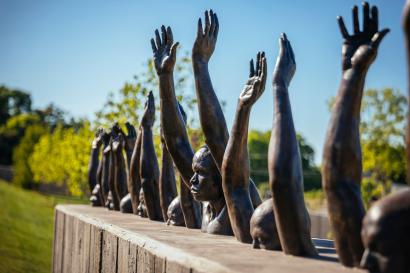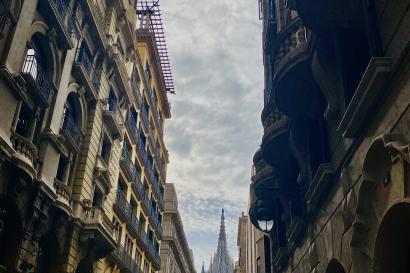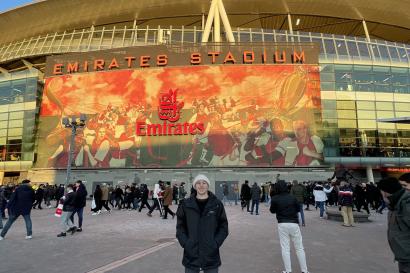
My favorite class here and one of the best courses I have ever taken is my photography class. I hesitantly chose to take this class, knowing that I had an interest and appreciation for photography, but lacking any time of prior knowledge. This scared me a little, but I kept telling myself that if I learned how to photograph in Spain, this would be a passion that I would cherish even more, and this is exactly what happened.
As the only one in my class who had a DSLR Camera, my professor was able to give me hands on instruction in using my camera, which was very beneficial as a complete novice. Following the first class of technical instruction. I walked around a few neighborhoods in Barcelona by myself and captured different parts of the city with my new knowledge of how to use my camera. It was an amazing feeling. After a few weeks of learning new concepts, and having the beautiful, dynamic city of Barcelona as a landscape, I have had this extraordinary opportunity to improve my ability to photograph with new scenery everyday.
This has quickly become my favorite hobby in Barcelona and I could not have asked for more from a class. I constantly ask my friend to go different places around the city so I can practice my portrait photography in different landscapes. I carry my camera with me in my backpack everywhere I go and I am always prepared to practice this new art. I have so much room to improve, and I can’t wait to see the extent that I carry out this hobby, both in Europe and home.
This class is not only my favorite because it has given me a hobby in Barcelona. More importantly, it has given me a greater perspective in understanding how photography is interconnected to so many issues and theoretical concepts in the world, and my brilliant professor has allowed me to recognize this.
My professor, Fred Anderson, has a special way of connecting photography with broader, more important topics that we should be thinking about in all of our classes. He has uniquely connected photography with different social issues in order for us to understand the implications of photography and the effect that we, as study abroad students have on the environment and the people who we are impacted around us. In my favorite lesson titled 'Landscape and Mortality', he addressed the impact we, as study abroad students have on local communities that we live in and visit every weekend. Through CO2 emitting flights, Airbnbs that are effectively gentrifying cities across the world, and fast fashion that contributes to environmental destruction, American study abroad student's tendencies are having more much negative contributions to local communities than we think. We are contributing to the creation of unlivable societies in multiple ways, whether we are making cities more expensive to live in by increasing the number of Airbnbs rented or hurting their environments with weekly flights, we are negatively affecting their land more in one weekend than residents of these communities often do in an entire year.
He then connected this to photography and how our iPhones have transformed the modern smartphone owner into a photographer and questioned the motives related to travel and photography. He questioned our motives for constantly traveling to different places, and often the same places as everyone else. Once many students came to the realization that capturing images of themselves to post on social media had an impact of where they traveled and why, it allowed us to more holistically challenge our motives and think about the greater implications of such minor rewards create. In this introspective and eye-opening class, Professor Anderson has challenged us students to question our actions and be more conscious about our impact on society, which is something most people of our generation could benefit from.
This is a model that I believe more teachers and curriculums should focus on doing. Too often, our classes teach about concepts related to the field of study, but neglect to connect them to more tangible issues in society. Professor Anderson's ability to do this made our class more engaging, for myself and other students in my class that I talked to as well, than all of my other courses. He is my favorite professor of all the educators I have had in my life because he constantly forced us to think broadly in order to make connections outside of our class material and challenged us to think consciously about our society, our actions and our motives in all contexts. If more professors would focus on making connections between curriculum and social issues that are impacting millions around the world, then our education would be more comprehensive, and accomplish the underlying purpose of our education: to enlighten and challenge students.

Shane Young
<p>I am a junior from Connecticut studying Finance, Africana Studies, and Economics. At the University of Connecticut, I am a consultant & the Director of Diversity in the UConn Consulting Group, VP of UConn FEC (teaching underprivileged elementary school students about financial literacy), President of the Club Basketball team, a practice player for the Women's Basketball team, a TA for the First Year Experience program, and a tutor for first-generation college students. In my free time, I enjoy playing basketball, working out, traveling to new places, having great conversations, discussing politics, reading, learning about and discussing injustice, and going out with my best friends and new people.</p>








